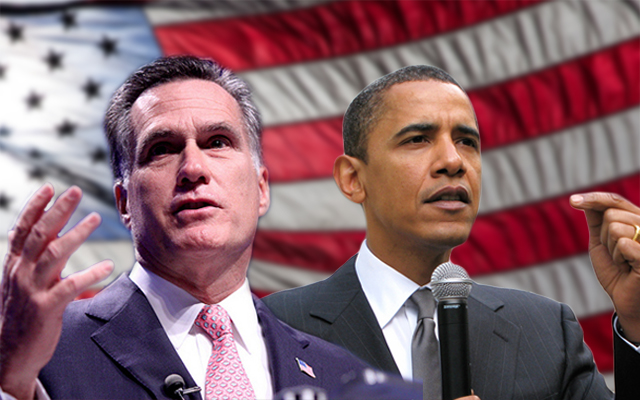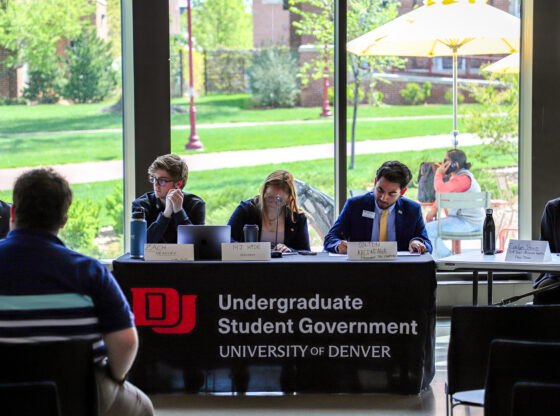Debate History
Presidential candidates have always taken advantage of media during their campaigns, using print and radio to draw the attention of the American population. Although both are still used and probably will always be, a now-common staple of presidential campaigns, the televised debate, wasn’t brought into use until 50 years ago.
One of the most famous debates from the pre-television era occurred in 1858, when future President and then Republican candidate for Senate Abraham Lincoln faced off against the incumbent Democratic Senator Stephen Douglas. After Lincoln followed Douglas to several campaign events and called out to him from the crowd, Douglas agreed to a series of seven debates. During each of the debates, which were not run by a moderator, one candidate would speak for an hour, followed by a 90-minute speech from the other candidate. The debate would close with a half-hour-long speech from the first speaker, according to NOW on PBS.
Even though Lincoln lost the Senate seat (and avoided a public debate during his run for president two years later), the impact the debates had on the American populace was immediate. Even though the state legislature was in charge of electing senators during this time, tens of thousands of citizens traveled across Illinois to track the progress of the two candidates.
During the 1960 election, however, everything changed. Contrary to popular belief, these debates were not the first debates on television; the first televised debates aired in 1952, sponsored by the League of Women Voters.
The 1960 presidential debate between Mass. Senator John F. Kennedy and Eisenhower’s Vice President Richard Nixon ignored the Communications Act of 1934 to allow for a two-man debate; the law said that under section 315, all legally qualified candidates were to be given equal airtime by a station, including those who weren’t from the now expected Democratic and Republican parties. The law also created the Federal Communications Commission as a substitute for the Federal Radio Commission.
During the first of four debates, Nixon, who was recovering from a knee infection, refused makeup and appeared sweaty and ill. Kennedy, on the other hand, looked prepared and calm for the debate, according to the Museum of Broadcast Communications How the event shaped public perception was extraordinary: Many viewers were sure Kennedy had won, while those listening to the debate on the radio believed Nixon was the winner.
The next televised presidential debate didn’t take place until 1976, nearly a decade and a half later.
In 1987, the Commission on Presidential Debates was created “to ensure that debates, as a permanent part of every general election, provide the best possible information to viewers and listeners,” according to their website. It is also accepted as the only institution capable of running a bipartisan debate.
Today, debates have evolved from the hours-long speeches of Lincoln’s day and have been long condensed into shorter, minutes-long statements.
Unemployment
One of the most discussed issues of the election for both candidates is the status of unemployment, currently at 8.1 percent according to the Bureau of Labor Statistics, and President Barack Obama’s record on job creation.
The unemployment rate under President Obama is still too high, according to Christina Romer, former chair of Obama’s Council of Economic Advisers, and current professor of Economics at the University of California, Berkley, who spoke to DU students and faculty last Friday in a Debate Event Series titled Restoring Fiscal Responsibility.
“It is very much above what is normal, what is acceptable,” said Romer.
During his term, Obama passed the Recovery and Reinvestment Act, which aimed to create jobs through an economic stimulus package priced at $787 billion at the time of passage, later readjusted to $831 billion, and focused spending in energy, health, education and expansion of unemployment benefits and social welfare provisions.
Since the passage of the bill, unemployment has fallen from 10 percent to 8.1 percent according to the August report by the Bureau of Labor Statistics.
However, Governor Mitt Romney says this is still not enough, and criticized the numbers as a “blow to the middle class” to the press in an Aug 3 interview. According to his campaign site, Romney plans to raise job rates through lowering personal, investment and corporate taxes in order to reduce government influence in the economy, which he says will help to stimulate job growth.
However, the Obama campaign claims this will place an additional burden on the middle class, which will inherit more taxes and ultimately put more people out of work, according to Obama’s campaign website.
According to Romer, the first step for candidates hoping to tackle the issue is to talk about it.
“More aggressive action is definitely important,” she said. “But communication, that’s the first step.”
According to Romer, the question we all need to be asking ourselves is ‘where do we go from here?’
“Sure, I’m an Obama supporter,” Romer said. “I understand that it has been hard [to create jobs] in this economy. I give him much credit for that. That’s one message. On the other hand, the second message should be that we’re not satisfied here.”
Student Loans
President Barack Obama and Governor Mitt Romney both come from different backgrounds, Obama as a community organizer in Chicago and Romney as a businessman who co-founded Bain & Company. Given their diverse backgrounds, their approaches to student loans differ.
The Pew Research Center has found that 22.4 million households, or 19 percent, had college debt in 2010. Currently more than 37 million Americans and the debt is peaking at $1 trillion according to a September 27 article in The Huffington Post.
In July 2012, both candidates spoke their approval when Congress voted against increasing the student loan interest rates from 3.4 percent to 6.8 percent. Though Obama and Romney both agree that interest rates on student loans need to remain low, both have different methods for doing so.
Obama has appealed to college students by promising to double Pell Grants, which go to low income students, during an October visit to Denver last year. He also created the American Opportunity Tax Credit in 2009, which gives tax breaks to full-time college students coming from a household making less than $80,000 per year according to the White House’s website. Obama has also proposed a “Pay As You Earn” program which caps monthly federal student loan repayment at 10 percent of monthly discretionary income, meaning that a responsible student can choose the college they want to attend based on their career goals and not only the price of tuition, according to his website. Obama has been running advertisements that bash Romney on his education plans and criticize him for telling students to “borrow money from your parents.”
Romney’s running mate, Paul Ryan, would reduce funding for Pell Grants, increase eligibility requirements and freeze the maximum grant at $5,550 as stated by the Center on Budget and Policy Priorities.
Romney expressed his disagreement at the University of Miami when he said, “I care about your education and helping people of modest means get a good education, and we’ll continue a Pell grant program,”.
According to ABC Today, Romney recently stated that making government the direct source of federal student loans has not worked. This flood of federal dollars drives up tuition.
Romney’s website claims that during Obama’s four years as president college students debts have risen and their chances of finding a job have declined. According to a Sept. 1 USA Today article, tuition fees at public colleges grew by 72 percent over inflation in the past four years.
Social Security
President Barack Obama and Mitt Romney both strongly agree that Social Security is a program that must stay strong for future generations according to the candidates’ campaign websites. Both agree that even though there are serious problems with funding for social security, we must find some way for everyone to reap its benefits when they reach retirement age.
Romney has laid out a series of steps that he believes should mathematically keep social security going for years to come. His first step would be to slowly increase the retirement age. He believes if people are living longer, they’ll just have to work a little bit longer. In addition, he would lower the rate of increasing social security benefits due to inflation for higher income citizens.
In this way, Romney’s primary plan is to cut the amount of social security benefits future generations will receive so we are able to afford it. He does, however, maintain that he would not change social security benefits for those 55 and older so citizens will be able to adjust to the new policy.
Obama has been less clear about his future plans for social security. He has shown support for the Bowles-Simpson plan, which would gradually raise the retirement age to 69 (similar to Romney’s plan) and lower benefits for those earning more than $40,000 a year by lowering the cost of living adjustment by 0.3 percent.
Obama believes social security should not be privatized, according to his campaign website. He believes that if it is, then benefits will be subject to the constantly swaying market and greed on Wall Street.
Environment
Environmental issues, particularly climate change, demand more attention from policy makers, according to Dr. Michael Monahan, a senior lecturer in the department of Biological Sciences at the University of Denver.
“Hopefully the environment will be one of the six major topics that Jim Lehrer [the first presidential debate moderator and executive editor of PBS’s ‘NewsHour’] will ask the candidates,” said Monahan.
“The overriding issue is climate change,” said Monahan. “Would I like to see them [Obama and Romney] debating the issue? Absolutely. Realistically, and regrettably it’s really not on their radars.”
Immigration
Romney and Obama both agree that the influx of illegal immigrants into the United States is a problem that must be dealt with, but they have differing views on how, and to what extent, they should work to fix it.
Romney believes in taking a heavy enforcement approach, meaning he wants to make it harder for immigrants to physically cross the border or over-stay their visa, according to his campaign website. President Obama agrees with Romney in that illegal immigrants are damaging to the economy and cannot be tolerated. In fact, the Obama administration issued more deportations during his first term than the Bush Administration according to. But Obama differs strongly from Romney when it comes to what to do with the nation’s young immigrants who were brought to the US by their parents, according to the Washington Post. Last June, the Obama Administration announced that it would stop deporting immigrants who were brought to the US before the age of 16.
Healthcare
Although some major portions of the Patient Protection and Affordable Care Act, also known as “Obamacare,” will not go into effect until 2014, it is still on the forefront of many Americans’ minds as the first presidential debate nears.
The effect of Obamacare has been a topic of much discussion within both parties. It has received attention especially after the Supreme Court examined the legality of the bill, finding it to be constitutional on June 28.
The Affordable Care Act, which was signed into law by president Obama on March 23, 2010, mandates every citizen have some form of health insurance, expands Medicaid and adds new regulations which prevents health care companies from dropping or denying coverage. It also allows young adults to stay on their parent’s health care insurance until they are 26.
“I think it was a very strange decision,” said Peter Hanson, a professor who specializes in American politics at DU said of the Supreme Court ruling. “Most people expected the decision to be determined on the grounds of whether or not Congress could require people to purchase health insurance as part of its power to regulate interstate commerce.”
However, the decision was made on the grounds of the government’s ability to tax citizens, a move made by Chief Justice Roberts that surprised the majority of the nation according to Dr. Hanson.
Romney wants to repeal the Affordable Care Act on the grounds that insurance should not be mandated for all Americans and adds too much to the national debt to employ the law.
“[The Affordable Care Act]is a disaster for the federal budget, a disaster for the constitutional principles of federalism, and a disaster for the American people.” Said Romney on his website, mittromney.com.
While many Republicans still stand in opposition to Obamacare, do not expect it to be a huge issue during the debate, said Hanson.
“Romney might bring up his desire to repeal it,” said Hanson. “I’m not sure if this argument has a lot of bite.”
Taxes
President Barack Obama is an advocate of the progressive tax system, which guarantees a progressively higher tax rate for every income bracket. He believes the present tax codes favor the wealthy over the middle and lower classes according to his campaign site.
Governor Mitt Romney has repeatedly attacked President Obama for his tax system, which Romney believes gives the government too much taxing power over its citizens. He has called for a scaled back governmental approach to taxes in many campaign speeches, and is especially vocal about wanting to repeal the taxes added through Obamacare.
Obama, however, has criticized Romney’s tax plan for scaling back on the wealthiest Americans, those with an income of more than $250,000, and placing that burden on the middle and lower classes, who could potentially see raised taxes under Romney’s plan to cut deductions.
According to a July 9 Reuters interview, Obama supports repealing the Bush-era tax-cuts for the wealthiest Americans, those who make $250,000 or more.
Obama also proposed in October 2011 the Paying a Fair Share Act, commonly known as the Buffet Rule, which he believes will restore tax fairness specifically to the middle class. The Buffet Rule, named after billionaire proponent Warren Buffet, is a principle that would not allow a household making more than $1 million to pay a smaller share of their income in taxes than middle-class families pay. According to a January 2012 White House press release, this principle will require millionaires to pay at least 30 percent of their income in federal taxes.
Romney is an advocate of lowering taxes for the wealthy and middle classes. He believes that the current tax codes encompass unnecessary high marginal income tax rates, which is the tax rate paid on the last dollar of one’s income.
According to his campaign site, his goal is to substantially lower the tax rates across the board by 20 percent for everyone. Romney also plans to keep all aspects of the Bush-era tax cuts in place, which lowers taxes for households making more than $250,000 per year. In regards to corporations, Romney wants to cut the 35 percent corporate tax rate as well as eliminate the estate tax and repeal the Alternative Minimum Tax (AMT), which is an alternative taxing system that ensures everyone pays a certain amount on taxes.
Romney wants to keep the current tax rate on capital gains, a tax on investment that everyone from investment bankers to senior citizens pay during the sale of investments.
Obama advocates raising the capital gains tax on people who make more than $250,000 a year.
DU Political Visits
The presidential debate to take place on campus tomorrow will mark the fourth time a president has visited the DU campus, and the fourth time a sitting president has visited according to DU Historian Steven Fisher.
According to Fisher, DU has previously hosted visits from William Taft, Dwight Eisenhower, John F. Kennedy, Lyndon Johnson, Richard Nixon, Ronald Regan, Bill Clinton and from current sitting president Barack Obama.
The first visit by a president was Taft’s visit to campus on October 3, 1911, exactly 101 years to the day prior to the 2012 Presidential debate. Taft spent the day speaking to members of the university, including the baseball team and members of the on-campus Republican organization.
Dwight Eisenhower suffered a heart attack while in Denver to visit DU, where he received an honorary Doctor of Laws degree from then Chancellor Albert Jacobs, according to Fisher. Eisenhower was hospitalized for seven weeks before being allowed to return to work in Washington D.C.
President Lyndon Johnson was another president to receive an honorary Doctor of Law degree from the university in 1966 according to Fisher. During his visit, Johnson visited the newly constructed Knudson Hall, which is now the Applied Research and Technology Institute.
Several presidential visits also took place inside the Fieldhouse Arena, now the Magness Arena, the same location President Barack Obama and Governor Mitt Romney will have their debate tomorrow.
Reagan, Nixon and Johnson all hosted speeches or events inside the Fieldhouse Arena, according to Fisher.
The most recent presidential visit to campus came in a two-fold event. In 2008 former president Clinton visited campus with his wife Hillary Clinton, now Secretary of State, who was then running for President. According to Fisher, future president Barack Obama also visited Magness Arena later that day.











